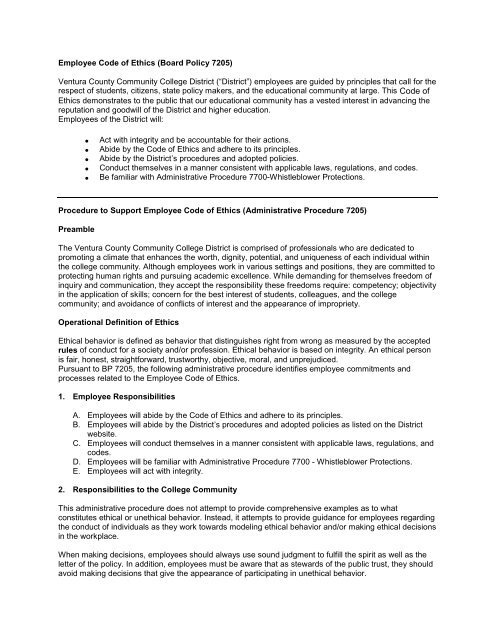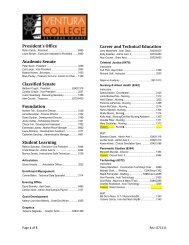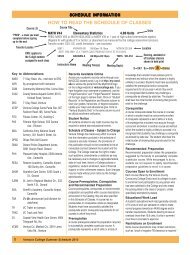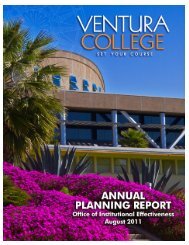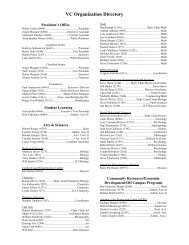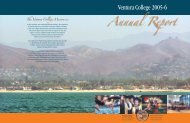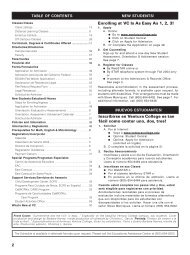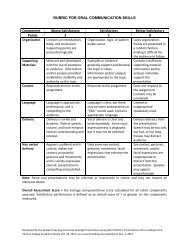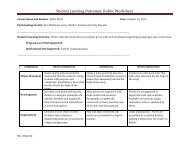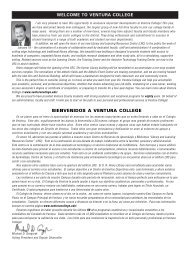Employee Code of Ethics (Board Policy 7205 ... - Ventura College
Employee Code of Ethics (Board Policy 7205 ... - Ventura College
Employee Code of Ethics (Board Policy 7205 ... - Ventura College
Create successful ePaper yourself
Turn your PDF publications into a flip-book with our unique Google optimized e-Paper software.
<strong>Employee</strong> <strong>Code</strong> <strong>of</strong> <strong>Ethics</strong> (<strong>Board</strong> <strong>Policy</strong> <strong>7205</strong>)<strong>Ventura</strong> County Community <strong>College</strong> District (“District”) employees are guided by principles that call for therespect <strong>of</strong> students, citizens, state policy makers, and the educational community at large. This <strong>Code</strong> <strong>of</strong><strong>Ethics</strong> demonstrates to the public that our educational community has a vested interest in advancing thereputation and goodwill <strong>of</strong> the District and higher education.<strong>Employee</strong>s <strong>of</strong> the District will:• Act with integrity and be accountable for their actions.• Abide by the <strong>Code</strong> <strong>of</strong> <strong>Ethics</strong> and adhere to its principles.• Abide by the District’s procedures and adopted policies.• Conduct themselves in a manner consistent with applicable laws, regulations, and codes.• Be familiar with Administrative Procedure 7700-Whistleblower Protections.Procedure to Support <strong>Employee</strong> <strong>Code</strong> <strong>of</strong> <strong>Ethics</strong> (Administrative Procedure <strong>7205</strong>)PreambleThe <strong>Ventura</strong> County Community <strong>College</strong> District is comprised <strong>of</strong> pr<strong>of</strong>essionals who are dedicated topromoting a climate that enhances the worth, dignity, potential, and uniqueness <strong>of</strong> each individual withinthe college community. Although employees work in various settings and positions, they are committed toprotecting human rights and pursuing academic excellence. While demanding for themselves freedom <strong>of</strong>inquiry and communication, they accept the responsibility these freedoms require: competency; objectivityin the application <strong>of</strong> skills; concern for the best interest <strong>of</strong> students, colleagues, and the collegecommunity; and avoidance <strong>of</strong> conflicts <strong>of</strong> interest and the appearance <strong>of</strong> impropriety.Operational Definition <strong>of</strong> <strong>Ethics</strong>Ethical behavior is defined as behavior that distinguishes right from wrong as measured by the acceptedrules <strong>of</strong> conduct for a society and/or pr<strong>of</strong>ession. Ethical behavior is based on integrity. An ethical personis fair, honest, straightforward, trustworthy, objective, moral, and unprejudiced.Pursuant to BP <strong>7205</strong>, the following administrative procedure identifies employee commitments andprocesses related to the <strong>Employee</strong> <strong>Code</strong> <strong>of</strong> <strong>Ethics</strong>.1. <strong>Employee</strong> ResponsibilitiesA. <strong>Employee</strong>s will abide by the <strong>Code</strong> <strong>of</strong> <strong>Ethics</strong> and adhere to its principles.B. <strong>Employee</strong>s will abide by the District’s procedures and adopted policies as listed on the Districtwebsite.C. <strong>Employee</strong>s will conduct themselves in a manner consistent with applicable laws, regulations, andcodes.D. <strong>Employee</strong>s will be familiar with Administrative Procedure 7700 - Whistleblower Protections.E. <strong>Employee</strong>s will act with integrity.2. Responsibilities to the <strong>College</strong> CommunityThis administrative procedure does not attempt to provide comprehensive examples as to whatconstitutes ethical or unethical behavior. Instead, it attempts to provide guidance for employees regardingthe conduct <strong>of</strong> individuals as they work towards modeling ethical behavior and/or making ethical decisionsin the workplace.When making decisions, employees should always use sound judgment to fulfill the spirit as well as theletter <strong>of</strong> the policy. In addition, employees must be aware that as stewards <strong>of</strong> the public trust, they shouldavoid making decisions that give the appearance <strong>of</strong> participating in unethical behavior.
The following illustrates broad areas <strong>of</strong> concern where questions <strong>of</strong> ethics need to be considered prior totaking a course <strong>of</strong> action:A. Being honest when dealing with others and performing job duties.<strong>Employee</strong>s are truthful in their discussions and in their work-related business, and do notintentionally withhold information, ignore data, or misrepresent facts or circumstances. They upholdthe highest standards <strong>of</strong> honesty in their daily work.B. Maintaining appropriate relationships.Appropriate relationships within the District are free <strong>of</strong> coercion, harassment, and the abuse <strong>of</strong>authority.<strong>Employee</strong>s: <strong>Employee</strong>s should refrain from entering into intimate relationships with Districtcolleagues if a reasonable person could conclude that an abuse <strong>of</strong> power exists or might exist inthose relationships. Supervisor/subordinate romantic or physical relationships are prohibited as isnepotism (see VCCCD <strong>Board</strong> <strong>Policy</strong> 7310).Students: A romantic or physical relationship between an employee <strong>of</strong> the District and a studentis prohibited in those instances where the employee has responsibility for directly supervising,evaluating, instructing, counseling, treating or otherwise overseeing the student. This is to protectthe student from possible coercion and harassment where an unequal balance <strong>of</strong> power isinherent in the relationship.Federal and State regulations regarding sexual harassment applie to this AdministrativeProcedure where appropriate.C. Maintaining confidential information.<strong>Employee</strong>s respect the privacy and confidentiality rights <strong>of</strong> co-workers and <strong>of</strong> students. Allconfidential information will be used only for the purpose for which it was originally collected andshared only with authorized parties on a need-to-know basis unless consent is given or requiredby law.D. Keeping political affiliations and activities separate from the workplace.As responsible and interested citizens in our democratic society, employees are encouraged toparticipate in the political process. However, employees do not use District resources in politicalcampaigns and activities or in support <strong>of</strong> or opposition to state bond measures, ballotpropositions, or particular candidates. <strong>Employee</strong>s holding elected <strong>of</strong>fice do not allow their politicalactivities to interfere with the performance <strong>of</strong> their District work.E. Exercising caution when accepting gifts, including honoraria.<strong>Employee</strong>s may accept gifts from others in limited circumstances, but must also be aware thataccepting any gift, favor, service, employment, or other thing <strong>of</strong> value could be inferred by a thirdparty to influence the employee in the discharge <strong>of</strong> their duties and therefore should be avoided.<strong>Employee</strong>s will not accept from any person, directly or through another person or party, any gift,favor, service, employment, or other thing <strong>of</strong> value that is intended to influence the employee inthe discharge <strong>of</strong> his or her duties at the District. The acceptance <strong>of</strong> honoraria for most public<strong>of</strong>ficials is prohibited.F. Avoiding conflicts <strong>of</strong> interest and the appearance <strong>of</strong> conflicts <strong>of</strong> interest.
<strong>Employee</strong>s do not use their position or District property for non-District, personal purposes. Theydo not allow their private interests, whether personal, financial, or <strong>of</strong> any other type, to conflict orappear to conflict with their work-related duties and responsibilities. <strong>Employee</strong>s avoid anyconduct that would lead a reasonable person to conclude the individual is biased or motivated bypersonal gain or private interest in the performance <strong>of</strong> their work.Full-time employees do not engage in any other employment that conflicts with, or is incompatiblewith their District responsibilities. Any exception for incidental emergencies are authorized by theemployee’s supervisor.G. Entering into unauthorized contracts.<strong>Employee</strong>s do not make unauthorized commitments or promises <strong>of</strong> any kind purporting to bindthe District in a contractual agreement, relationship or partnership.3. What to do when there is an ethical concern and/or steps for reporting violation ethics.A. <strong>Employee</strong>s may seek the advice <strong>of</strong> a supervisor or a human resources manager to clarify rulesand regulations impacting their duties. <strong>Employee</strong>s governed by pr<strong>of</strong>essional and/or disciplineconduct standards will comply with these requirements, in addition to those described in this<strong>Employee</strong> <strong>Code</strong> <strong>of</strong> <strong>Ethics</strong>.B. Allegations <strong>of</strong> unlawful activities may be filed pursuant to VCCCD <strong>Board</strong> <strong>Policy</strong> 7700-Whistleblower Protections and its associated administrative procedure.C. Violations <strong>of</strong> VCCCD <strong>Board</strong> <strong>Policy</strong> 3430-Prohibition <strong>of</strong> Harassment and Discrimination may bereported pursuant to its associated administrative procedure when the allegation relates acomplaint <strong>of</strong> discrimination or harassment regarding gender, race, color, religion, national origin,age, disability, Veteran’s status, sexual orientation, or political affiliation.4. Consequences for exhibiting unethical behavior that may also be in violation <strong>of</strong> law.<strong>Employee</strong>s should be aware <strong>of</strong> various policies, statutes, laws, and rules that touch on ethics. Sometimesunethical behavior can also be illegal behavior. Exhibiting or participating in unethical behavior can haveserious consequences, including adverse employment actions (that is discipline up to and includingdismissal per California Education <strong>Code</strong> section 87732 and Personnel Commission Rule 263), civilpenalties and criminal penalties. The following information is non-exhaustive and is listed as a resourcefor employees to refer to regarding:A. Reporting <strong>of</strong> improper conduct and keeping colleagues safe from retaliation for filing such reports:i) California Education <strong>Code</strong> sections 87160 and 87163; ii) VCCCD <strong>Board</strong> <strong>Policy</strong> andAdministrative Procedure 7700 - Whistleblower ProtectionsB. Potential problems associated with the improper influence <strong>of</strong> family members and associates: i)California Government <strong>Code</strong> sections 87100-87103; ii) VCCCD <strong>Board</strong> <strong>Policy</strong> 7310 – NepotismC. <strong>Employee</strong>’s obligation to maintain appropriate relationships with students: California Education<strong>Code</strong> section 87732.D. <strong>Employee</strong>’s obligation to uphold confidentiality: California Government <strong>Code</strong> section 1098.E. Potential problems associated with conflicts <strong>of</strong> interest and outside income: i) CaliforniaGovernment <strong>Code</strong> sections 1090, 1098, 1126, 87100, 87103, 87200; ii) California Penal <strong>Code</strong>section 504; iii) California Fair Political Practices Commission (www.fppc.ca.gov).
F. Potential problems associated with using a District position to support political candidates orparties: i) California Education <strong>Code</strong> section 7054; ii) California Government <strong>Code</strong> sections 8314and 8900.G. Potential problems associated with the acceptance <strong>of</strong> gifts: i) California Government <strong>Code</strong>sections 89500-89503, 89506; ii) California Fair Political Practices Commission(www.fppc.ca.gov).


